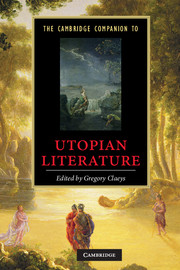7 - Utopia and romance
from Part II - Literature
Published online by Cambridge University Press: 28 September 2010
Summary
“Romance is a figure with outstretched hands, yearning for the unattainable.” E. M. Forster, The Longest Journey / Utopia, the good place which is no place, is also the place at the end of the traditional fairy tale, where 'They all lived happily ever after.' If romance, as Forster says, is an expression of the yearning for the unattainable, then utopia is that which cannot be attained - the happy-ever-after which always eludes us no matter how near we draw to it. In utopian narratives, the blissful state fleetingly evoked in the fairy tale's final sentence is extended to a whole society, and fully and often pedantically spelt out. The fundamental purpose of both romances and utopias is to 'remake the world in the image of desire', but the image of desire in each case is very different. The heart of romance are the physical and emotional torments suffered by its heroes and heroines and their determination in the face of adversity; utopia, by contrast, portrays a collective, not individual, reward for suffering humanity as a whole. If romance is Cinderella, then utopia is a fairy godmother not just to the heroine but to the whole world. Romance and utopia have something in common but are in many ways opposites. It is with this in mind that we should approach the genre of the utopian romance, which came into its own with the spread of modern popular fiction on utopian and dystopian themes.
- Type
- Chapter
- Information
- The Cambridge Companion to Utopian Literature , pp. 154 - 173Publisher: Cambridge University PressPrint publication year: 2010



